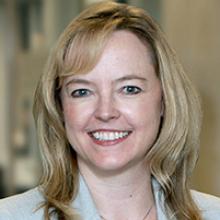Positioning Workforce Training to Respond to the Rise in Skills-Based Hiring

Tens of millions of U.S. adults lack basic literacy, numeracy, and digital skills, and millions more lack a high school diploma. Without these skills or credentials, most of these individuals cannot access employment opportunities in high-wage, high-demand occupations and industries that are increasingly focusing on skills in their hiring processes. Many jobs in today’s economy require skills training beyond high school, but not a four-year degree. Yet few workforce development programs have any measurable impact on earning power or mobility out of poverty for adults who want to build their skills.
Year Up is a rare exception. Year Up provides its program participants with the opportunity to develop essential career readiness and business skills, build foundational technical capabilities, and complete an immersive, work-based learning experience with a leading employer partner. A randomized controlled trial found that program graduates landed a living-wage job and continued out-earning individuals who did not participate in the program for years.
With support from the AIR Equity Initiative, AIR’s PROMISE Center is partnering with Year Up to expand its nationwide program with fidelity. In this Q&A, Christina Curnow, managing director of Human Capital Solutions, shares how this work could help scale up effective skills-based training programs, expand and diversify the workforce, and support employers’ skills-based hiring practices.
Q. What is happening in the employment and workforce landscape that makes skills-based training programs particularly relevant now?
Curnow: Over the past few decades, the nature of work has been rapidly changing due to globalization, technology, and other factors. This means that transferable skills, such as problem solving, communication skills, teamwork, and digital literacy, are more desirable than ever. At the same time, there is increasing need for upskilling and reskilling within the existing employee base.
In times of labor shortages, employers can think more expansively about who can fill job openings by focusing on skills.
In times of labor shortages, employers can think more expansively about who can fill job openings by focusing on skills. There is a movement across many employers in our economy, including federal and state governments, toward skills-based practices for hiring new employees. Instead of saying, “I need someone with a bachelor’s degree in psychology,” it’s, “What are the specific skills that I need?” Employers are breaking down the job into a more granular level and then seeking applicants who have those skills, with the recognition that many skills can be acquired not just through education, but through other types of training or experience.
This movement really shines more light on a broader range of potential applicants who have the skills to be a strong fit for a particular role, while also increasing the diversity of the applicant pool. There’s a logical corollary to skills-based hiring: If you hire that way, you also must think about career development and promotions that way as well.
Q. What challenges does Year Up face in its efforts to scale up?
Curnow: Year Up has served more than 40,000 young adults since its founding in 2000. The Year Up team has ambitious goals to serve significantly more young adults and build a movement for equitable employment. Year Up’s philosophy is centered on the belief that every young adult has potential and deserves opportunity and economic justice, and it is committed to equipping young adults with the skills, experience, and support they need to enter corporate America and thrive in their professional journeys. Recognizing where young adults are on the skill spectrum and what skills they need to build to be ready for the workforce is an important part of the program.
- Computer skills
- Written communication
- Learning agility
- Proactivity
- Perseverance
- Complex problem solving
- Interpersonal relationships
- Email and calendar software
When our partnership began, Year Up was grappling with the challenge of retaining program quality while scaling up. Year Up assesses candidates when they come into the program to determine their overall readiness for the program, training, and career opportunities. But the Year Up team recognized that they were not assessing all incoming participants or tracking their development over time in a particularly consistent way. Ultimately, when Year Up sends students to internships, they want employers all over the United States to know they’re getting interns with a baseline of skills that will help them be successful. Quality underpins employer relationships and students’ success in the program and beyond.
So, to consistently ensure that their students have the skills necessary for success, Year Up partnered with AIR to help develop valid and reliable assessments to track student progress across the life cycle of their program. Developing valid and reliable assessments of workforce skills is one of AIR’s capabilities that sets us apart. We develop formative and summative assessments and create equitable assessment processes that ensure skill quality and enhance diversity across organizations.
Q. What is the value of skills-based assessment for workers and employers?
Curnow: For individuals entering the labor market, it’s becoming more important to be able to identify, talk about, and quantify their skills in particular areas. And it’s important for them to be able to think about their skillsets beyond their current job. For example, if I’m currently a retail associate, I can’t just think of myself as an employee at a big-box store. I have gained customer service skills, increased my numeracy skills by running a cash register and making change, learned about inventory and ordering products. These are skills that can be applied in many occupations.
AIR’s work with Year Up is specifically assessing workplace and career readiness skills, which in many ways I view as foundational to being successful in any workplace. These assessments, which are unique in focusing on cross-cutting skills applicable in any industry sector, span four major areas:
- Technology
- Communication
- Personal effectiveness
- Career and workplace effectiveness
Valid and reliable assessments can verify that individuals have acquired valued skills and identify areas in which they need additional work to be successful in their Year Up internships. There’s interest in continuing these assessments through the end of the work-based experiences, which would pave the way for program graduates to show their levels of skills to employers.
[T]he type of assessment system AIR is building for Year Up has the potential to be scaled more broadly, enabling employers to identify workplace and career readiness without relying on a credential.
Plus, the type of assessment system AIR is building for Year Up has the potential to be scaled more broadly, enabling employers to identify workplace and career readiness without relying on a credential. This would expand and diversify the pool of job candidates and promote equitable hiring.
For employers who want to continue the journey toward skills-based hiring, career development, and promotions, pairing assessments of technical skills with assessments of workplace and career readiness skills could help them identify more clearly who’s likely to be successful on the job. For example, it’s very common in the IT industry to assess technical skills, such as a simulation where a job candidate is asked to write some code. That’s a great tool, but it doesn’t necessarily tell you how well that person will get along with your team and function in your office environment.
Postsecondary institutions—and many employers—don’t always focus on workplace and career readiness skills. While we are still in the early stages of research on Year Up’s practices, our hypothesis is that the “secret sauce” for its success is that its program melds technical, workplace, and career readiness skills together.
